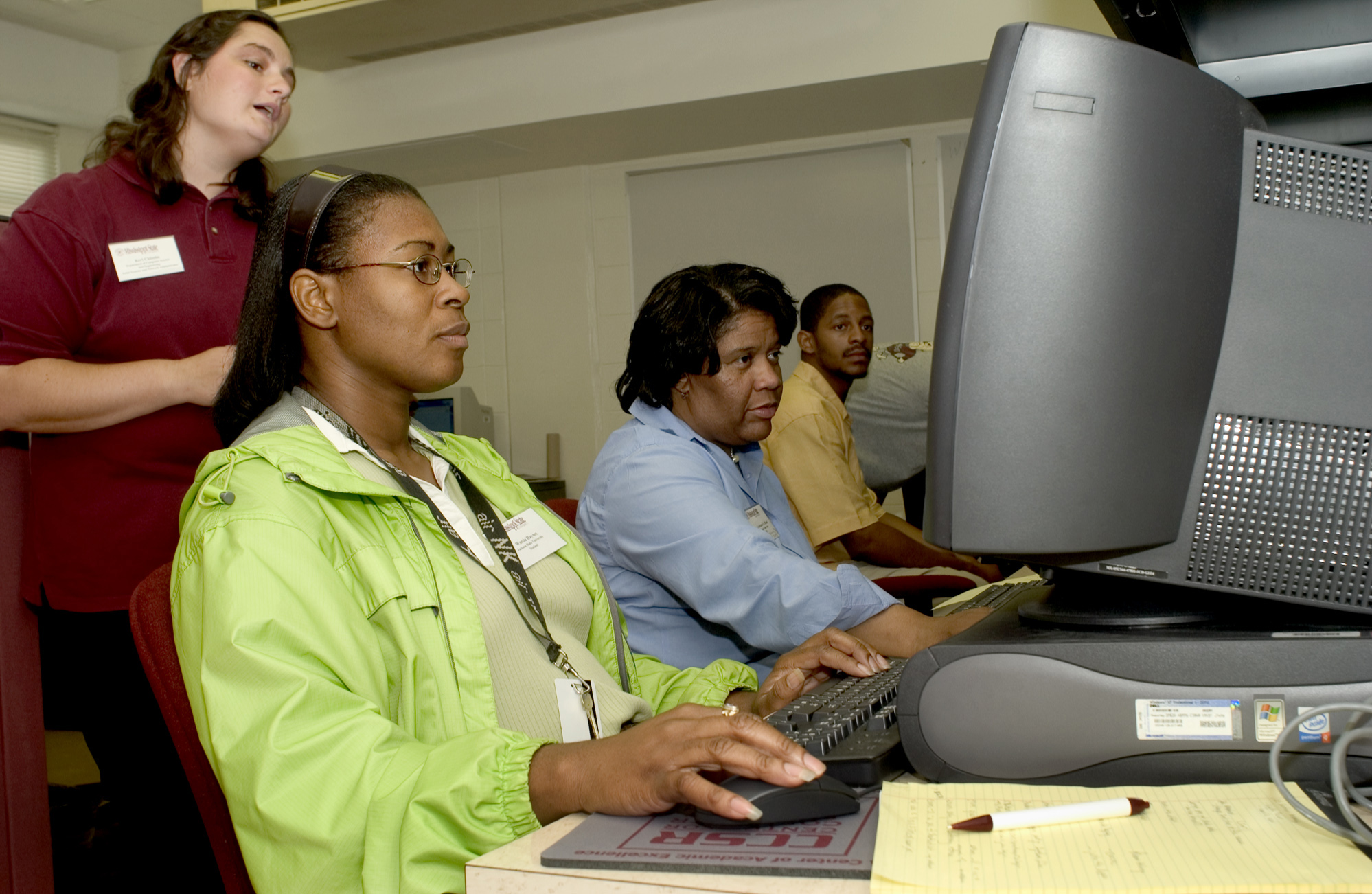Contact: Phil Hearn

Keri Chisolm (standing), assistant systems and network administrator for Mississippi State's Center for Computer Security Research, provides guidance to workshop participants (l-r) recent Jackson State University graduate Wanda Haynes and Mississippi Valley State computer science professor Constance G. Bland. They were learning how to take a "byte" out of crime during MSU's June 23-24 Information Assurance Workshop.
More than 30 mostly minority college and high school students and faculty from nine institutions of learning were told Wednesday [June 23] how they can help take a "byte" out of crime by pursuing careers in the field of computer security.
"Terrorists today are looking to attack our critical infrastructure in an effort to really bring harm to our economy," Mississippi State professor Ray Vaughn said during an opening session of the university's Information Assurance Workshop.
MSU professor David Dampier, conducting a later session on computer forensics, said information-age experts working in law enforcement and private business examine computer files and fragments of files, "all the way down to bytes," to track such cyberspace crimes as child pornography, embezzlement and identity theft.
"The No. 1 crime in the country is child pornography. That represents about 80 percent of all computer crimes," said Dampier, noting evidence retrieved from computers often is presented as legal evidence to help convict computer criminals.
Sponsored by the MSU Center for Computer Security Research and funded by the National Science Foundation, the two-day training program provided participants with details about careers in computer security and ways to establish information assurance programs at their respective schools.
Vaughn is a retired Army colonel who once directed communications and computer systems for the Pentagon. He joined the MSU faculty in 1997 and led the university to National Security Agency certification a year later as one of only 26 initial Centers of Academic Excellence in Information Assurance in the nation.
He said students chosen for the MSU center's Cybercorps Scholarship Program benefit from full scholarships paying nine-month salaries ranging from $8,000 to $15,000, plus free tuition and supplies, all fees and, in some cases, housing assistance.
Dampier, one of Vaughn's colleagues in the department of computer science and engineering, teaches a unique computer forensics course that focuses both on investigative techniques for exposing computer-related crimes and the tracking of their perpetrators through retrieval and analysis of electronic evidence.
"Some of these participants have never been introduced to the security aspects of computers and they'll be able to take this information back to their schools," said MSU computer science graduate student Chevonne Thomas of Columbia, a 2003 Jackson State University graduate who served as a counselor for the visiting students.
In-state institutions represented at the event included Jackson State, Alcorn State and Mississippi Valley State universities, Mississippi University for Women, and Rust College. Representatives from Tuskegee University in Alabama, and Maryland's Bowie State University and Annarundel Community College also participated.
The workshop, which targeted underrepresented groups and historically black institutions, also attracted a group of high school students from the Washington, D.C., area. That contingent was sponsored by the Joint Educational Foundation, a program that works with high-achieving students in high-risk areas.
"I hope that learning computer skills can help catapult me into pursuing a career in cardiology," said 17-year-old Andre Strong, a rising senior at Thomas Edison High School in Alexandria, Va. A self-described "computer geek" and member of the JEF group, he said the MSU event also provided "some networking opportunities."
The workshop, scheduled to continue at 8 a.m. Thursday, covered such topics as information security, network security, computer forensics, and cryptography. It was held at Butler Hall, home to MSU's department of computer science and engineering.
Ernest McDuffie, program manager in the NSF's Division of Undergraduate Education, was the keynote speaker for a Wednesday evening dinner at the university's Leo Seal M-Club Building. MSU head women's basketball coach Sharon Fanning gave a motivational talk at the same event.